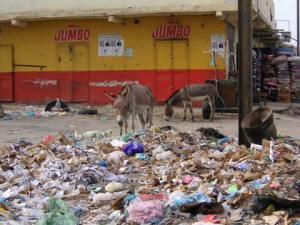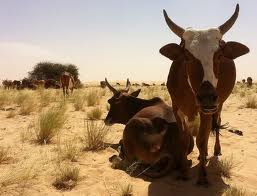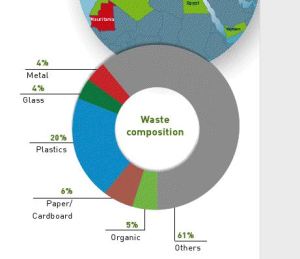Getting rid of plastic, which accounts for 10% of total waste and uses 8% of the global oil supply annually, is a great idea, as long as it is done in a sensible, sustainable way. It’s not difficult to make compelling arguments for saving scarce resources and protecting the planet and all forms of life. Yet Mauritania seems to have missed the mark by a mile with a poor choice of material for its Project Zazou (2013) press announcement.
There was a lot of interest when BBC Africa reported on the new ban on plastic bags, informally known as “Zazou” in Mauritania. They highlighted a quote from the Environment Ministry spokesman, who apparently claimed that 70% of cows & sheep that die in the capital Nouakchott are killed by plastic bags. Nouakchott has plenty of donkeys and goats, but is not known for its herds of cows or sheep. How many are being killed in a year? What about goats, donkeys or even camels?
The claim that 80% of all cows slaughtered for food were found to have plastic in their stomachs is another sensational conundrum, as once again they did not say how many head of cattle were involved. But this factoid also leads to the conclusion that more than 80% of cows are not being cared for properly, if they are being left to forage for food in city garbage like wild animals.
Did I miss something, and the feed in the Emel 2012 food security programme that killed hundreds of head of livestock and made others sick actually contained plastic? Probably not, as these deaths occurred in the rural areas where the majority of livestock are located. So if this news story conjured visions of Serengeti-sized herds of feral cows roaming the streets of Nouakchott or Nouadhibou, sorry to disappoint.
Plastic makes up 25% of 56,000 tonnes of waste produced annually in Nouakchott, according to the statement issued for this occasion. It is not clear whether that includes the far heavier containers used for liquids like water, soft drinks and oil, hundreds of thousands of which are discarded every year – these are not part of the ban. The detailed SweepNet report on Sold Waste Management in Mauritania [PDF] from July 2010 gives a figure of 20% for all plastics (and 16% for sand!) in 2009. This would indicate a rather different statistic for plastic bags, even allowing for the 6% overall annual growth in solid waste predicted by SweepNet.
Mauritania’s spokesman also admitted that almost all plastic waste is available to animals because it is not being collected or sent to landfill sites. SweepNet tells us that only 5% of waste is collected in rural areas, and just 30% in cities, of which almost 55% is dumped in the open, including any medical waste that is not incinerated. The small amount of recycling that happens in Mauritania is done by private small-scale craft enterprises or occasional informal projects. If the mythical hordes of urban livestock have just been replaced by new images which result from thinking about livestock feasting on medical waste, I recommend a vegetarian diet.
The most enlightening information in the SweepNet report concerns the financial data and sources of funding for waste management, including a previous “Zazou” project, which I quote here, with my emphasis on the budget figure:
The international NGO, GRET, has completed the ZAZOU Project with funding from the Commission (EC), the International Organization of La Francophonie (OIF), the Italian NGO LVIA, the “Fondation Ensemble” and VEOLIA to the amount of 787,000 Euros. This had to do with building and fitting a plastic waste recycling center. The center has become operational in the last few months.
This fact raises some interesting questions, about funding and project risk management for starters. Actually, I have a lot of questions about this ban, and how the overall campaign is being managed and funded. I put some of them to the campaign manager three days ago but he had not responded at the time of writing this post. I’ll post an update if he provides more information.
In Toronto, which also introduced a total ban on single-use plastic shopping bags from 1 January 2013, the move was seen by some as a pointless and flawed exercise that would not yield significant benefits. One estimate said plastic bags represented less than 1% of total waste in landfills. The lack of consultation on the ban in Toronto heightened concerns but a motion to re-open the debate in Canadian parliament failed to win the vote, to the chagrin of Councillor John Parker:
What is harder to fathom: voting to ban plastic bags without taking advice, or taking advice and voting not to reconsider the ban.
— John Parker (@johnparker26) October 3, 2012
So Canada has its doubters, but can Mauritania lead the way for environmental protection? Despite the obvious advantages, we should not get our hopes up too soon. 2009′s “Project Zazou” fizzled out after 3 months, so they will need to apply the lessons learned from that time to make this effort a massive success. There is a lot of popular support for the idea, but people will need sustained help and guidance to establish new habits. A stable political, economic and social environment would also be a huge help, but stability would be much more likely with a legitimate government and genuinely democratic system, neither of which exists in Mauritania at the moment.
What about us, you and me? There’s lots we can do as individuals, such as these 16 simple ways to reduce plastic waste. More tips and information in the links below.
Related articles
Posted via email from lissping



No comments:
Post a Comment
Note: only a member of this blog may post a comment.